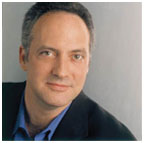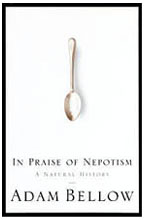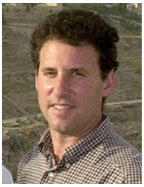December 17, 2003: Reading Room
 |
| Adam Bellow ’80 claims that his father, Saul Bellow, was a “total dud” as a nepotist. (Photo: Sigrid Estrada) |
In
defense of nepotism
Adam
Bellow ’80 argues that Americans practice it even as they deplore
it
By Katherine Zoepf ’00
The book jacket alone might hit some prospective readers like a finger in the eye — an expanse of white broken only by a single silver spoon, with a weighty, expensive-looking handle. Underneath, the title, In Praise of Nepotism: A Natural History, seems deliberately provocative.
The author, Adam Bellow ’80, has made a career out of such provocations. As an editor at Free Press and, now, at Doubleday, several books he worked on have been famously controversial. They include Dinesh D’Souza’s Illiberal Education (1991), which argued that many attempts to promote campus multiculturalism actually foster racial tensions, and Charles Murray and Richard J. Herrnstein’s The Bell Curve (1994), which argued that intelligence is distributed unequally by race and class. “I’m a real intellectual outlaw,” he says.
With his own first book, published this year by Doubleday, Bellow has stayed true to form. Much of In Praise of Nepotism is a straight history of nepotistic practices through the ages, from King David’s vow in the 10th century b.c.e. that the son of his wife, Bathsheba, would succeed him, to Joseph Kennedy’s machinations on behalf of his sons’ careers. But Bellow’s central thesis — that a “new nepotism” is on the rise in American public life and that this may help to balance our excessive faith in the concept of pure meritocracy — has caused its share of indignation among columnists and talk-show hosts.
 Bellow
argues that nepotism is a natural, positive force, and that nearly everyone
will practice it if given the chance. He believes that people compete
better as families, and that, in general, strong family traditions make
for wiser politicians and better-run businesses.
Bellow
argues that nepotism is a natural, positive force, and that nearly everyone
will practice it if given the chance. He believes that people compete
better as families, and that, in general, strong family traditions make
for wiser politicians and better-run businesses.
Bellow, of course, is the son of novelist and Nobel laureate Saul Bellow. But though he freely admits that his father’s name gave him a boost early in his publishing career, Bellow says that his interest in nepotism does not stem from any particular experience of his own.
“As a nepotist, he was a total dud,” Bellow said of his father. “The only job he ever got me was shelving books at the Strand.” Rather, Bellow says, he became intrigued by contemporary examples of family enterprise in American political and cultural life. Regardless of race, class, or income, Bellow believes, Americans are increasingly practicing many forms of nepotism even as they outwardly claim to deplore it.
In contrast to what he calls “old nepotism,” when parents hired children or pulled strings to get them jobs for which they may have been ill-prepared, Bellow defines the “new nepotism” broadly, as ways in which people benefit from a family name — using the name, or connections, to open doors even if parents don’t do anything directly to land the child a job. He cites examples as varied as the Bushes in politics; the Newhouses in publishing; and the Cusacks in Hollywood.
“People don’t like to discuss nepotism because it tends to
compromise their self-images as self-made men and women,” Bellow
says. “Americans tend to badly exaggerate the extent to which they’re
self-made.” ![]()
Katherine Zoepf ’00 is a graduate student at the London School of Economics.
 |
| Based in Jerusalem, Joshua Hammer ’79 writes for Newsweek. |
Inside
the intifada
Joshua Hammer
’79 tells the story of a West Bank city
By Joseph M. Hochstein ’55
For his senior thesis, Joshua Hammer ’79 created a two-character stage play. Now, in his second nonfiction book — an intricate piece of journalism titled A Season in Bethlehem: Unholy War in a Sacred Place, published by Free Press this fall — Hammer works on a bigger, more crowded stage. His opening pages, which he heads “Cast of Principal Characters,” introduce 21 real-life dramatis personae caught up in the Israeli-Palestinian conflict.
Hammer’s aim in writing this book, he says, was to go deeper than the day-to-day violence he was covering as Newsweek’s Jerusalem-based Middle East bureau chief.
An English major at Princeton whose first book, Chosen by God: A Brother’s Journey (1999), recounts his reunion after almost two decades with his younger brother, who had embraced ultraorthodox Hasidic Judaism, Hammer has been reporting on the Palestinian-Israeli conflict since October 2000, only weeks after the current intifada began, talking to people on various sides. A Season in Bethlehem focuses on one front in this war. The book is mainly a reconstruction of events, pieced together from interviews conducted in the summer and fall of 2002 after a U.S.-European-brokered compromise ended a 39-day standoff between Palestinian gunmen and Israeli soldiers at Bethlehem’s Church of the Nativity.
Hammer’s cast includes an exiled militia commander (“a sociopath whom the intifada had elevated into a freedom fighter”); a student who becomes the intifada’s first female suicide bomber; her stunned father (whose “private grief had been co-opted into a public spectacle”); and Hammer’s translator, a Greek-Orthodox Palestinian who would let his son marry a Lutheran or a Roman Catholic, or even a Jew, but never a Muslim.
Almost all of Hammer’s characters are Palestinian Arabs. Hammer explores their rivalries, hopes, disagreements, and misgivings in their armed uprising. With few exceptions, Jews and their versions of the Israel-Palestine narrative remain offstage.
Hammer, who rejects charges of bias by some readers, sometimes has been a source of controversy himself. In 2001 a pro-Israel group criticized him for not voicing outrage over his own mini-kidnapping by armed Palestinians in Rafah to protest U.S. and British news coverage. After his release, Hammer said, “They actually fed us one of the best meals I’ve eaten in Gaza.” He says he knew he wasn’t in danger.
This summer, the Palestinian-led International Solidarity Movement published an attack on Hammer on its Web site and called for a retraction of a Mother Jones article in which he made some unfavorable comments about the I.S.M. and Rachel Corrie, a U.S. activist killed by an Israeli bulldozer in Rafah.
While critical of the Palestinian side, Hammer assigns greater blame
to Israel and its prime minister. “Ariel Sharon’s dependence
on retribution alone to put down the uprising promised only the perpetuation
of the dismal status quo,” concludes Hammer, who offers no happy
endings in his book. He writes that after the church standoff, “Bridging
the ever-widening abyss of distrust and hatred that separated the Israelis
and the Palestinians seemed . . . a more formidable challenge than ever.”
![]()
Joseph M. Hochstein ’55 is a writer and editor in Tel Aviv, Israel.
BOOK SHORTS
 American Synagogues:
A Century of Architecture and Jewish Community — SAMUEL D. GRUBER
’77 (Rizzoli). In this survey of 20th-century American synagogues,
Gruber explores how the history of the Jewish people is expressed in synagogue
design. The author looks at 35 houses of worship, including Beth Sholom
Synagogue in Elkins Park, Pennsylvania, designed by Frank Lloyd Wright
in 1957. Color photos by Paul Rocheleau accompany the text. Gruber teaches
in the Judaic studies program at Syracuse University and is president
of the International Survey of Jewish Monuments.
American Synagogues:
A Century of Architecture and Jewish Community — SAMUEL D. GRUBER
’77 (Rizzoli). In this survey of 20th-century American synagogues,
Gruber explores how the history of the Jewish people is expressed in synagogue
design. The author looks at 35 houses of worship, including Beth Sholom
Synagogue in Elkins Park, Pennsylvania, designed by Frank Lloyd Wright
in 1957. Color photos by Paul Rocheleau accompany the text. Gruber teaches
in the Judaic studies program at Syracuse University and is president
of the International Survey of Jewish Monuments.
 The Art of the Limoges
Box — Nancy Du Tertre (Nancy Lester) '78 (Abrams). A designer
of Limoges boxes, du Tertre traces the Limoges lineage from snuffboxes
to vessels for love notes to collector’s items. For collectors, she
also includes tips on finding the best boxes. Du Tertre is part-owner
of the manufacturer Artoria Limoges in Limoges, France.
The Art of the Limoges
Box — Nancy Du Tertre (Nancy Lester) '78 (Abrams). A designer
of Limoges boxes, du Tertre traces the Limoges lineage from snuffboxes
to vessels for love notes to collector’s items. For collectors, she
also includes tips on finding the best boxes. Du Tertre is part-owner
of the manufacturer Artoria Limoges in Limoges, France.
 Empire of
Light — DAVID CZUCHLEWSKI ’98 (Putnam). Czuchlewski’s
second novel, a mystical mystery, tells the story of underachieving Princeton
alumnus Matt Kelly. When Kelly’s formerly rich ex-girlfriend reappears
in his life, penniless and a member of a secret religious organization
called Imperium Luminis, Kelly tries to save her by joining the cult himself.
Czuchlewski is a medical resident at New York Weill Cornell Medical Center.
Empire of
Light — DAVID CZUCHLEWSKI ’98 (Putnam). Czuchlewski’s
second novel, a mystical mystery, tells the story of underachieving Princeton
alumnus Matt Kelly. When Kelly’s formerly rich ex-girlfriend reappears
in his life, penniless and a member of a secret religious organization
called Imperium Luminis, Kelly tries to save her by joining the cult himself.
Czuchlewski is a medical resident at New York Weill Cornell Medical Center.
 The Boat of
Dreams: A Christmas Story — RICHARD PRESTON *83 (Touchstone).
Preston originally wrote this uplifting story several years ago for a
friend who was dying of breast cancer. The Boat of Dreams is about a family
whose father was lost in action in Vietnam. Often home alone, the two
children notice that a cranky ghost has been visiting their trailer. But
soon they find the “ghost” is Santa Claus himself. Author of
The Hot Zone (1994), Preston is a contributor to the New Yorker.
The Boat of
Dreams: A Christmas Story — RICHARD PRESTON *83 (Touchstone).
Preston originally wrote this uplifting story several years ago for a
friend who was dying of breast cancer. The Boat of Dreams is about a family
whose father was lost in action in Vietnam. Often home alone, the two
children notice that a cranky ghost has been visiting their trailer. But
soon they find the “ghost” is Santa Claus himself. Author of
The Hot Zone (1994), Preston is a contributor to the New Yorker.
 Autumn Glory:
Baseball’s First World Series — LOUIS P. MASUR *85 (Hill
& Wang). In 1903 the Pittsburgh Pirates challenged the underdog Boston
Americans to a postseason play-off and ended up losing four games to five.
Masur chronicles the story of this first World Series and how it saved
baseball, a sport that had been splintering due to greed, labor strife,
and unrest. Masur is a history professor at City College of New York and
the editor of Reviews in American History.
Autumn Glory:
Baseball’s First World Series — LOUIS P. MASUR *85 (Hill
& Wang). In 1903 the Pittsburgh Pirates challenged the underdog Boston
Americans to a postseason play-off and ended up losing four games to five.
Masur chronicles the story of this first World Series and how it saved
baseball, a sport that had been splintering due to greed, labor strife,
and unrest. Masur is a history professor at City College of New York and
the editor of Reviews in American History.
 A Brief History
of the Human Race — MICHAEL COOK (Norton). In this overview of
the last 10,000 years of human history, Cook looks at how mankind evolved
in the regions of the world. A Brief History is both a broad investigation
of the main lines of human development and a more focused examination
of some cultural trends. For example, Cook explores Greek pottery, Chinese
ancestor cults, and marriage rites among Australian aborigines. Cook is
a professor of Near Eastern studies.
A Brief History
of the Human Race — MICHAEL COOK (Norton). In this overview of
the last 10,000 years of human history, Cook looks at how mankind evolved
in the regions of the world. A Brief History is both a broad investigation
of the main lines of human development and a more focused examination
of some cultural trends. For example, Cook explores Greek pottery, Chinese
ancestor cults, and marriage rites among Australian aborigines. Cook is
a professor of Near Eastern studies. ![]()
By Lucia S. Smith ’04
